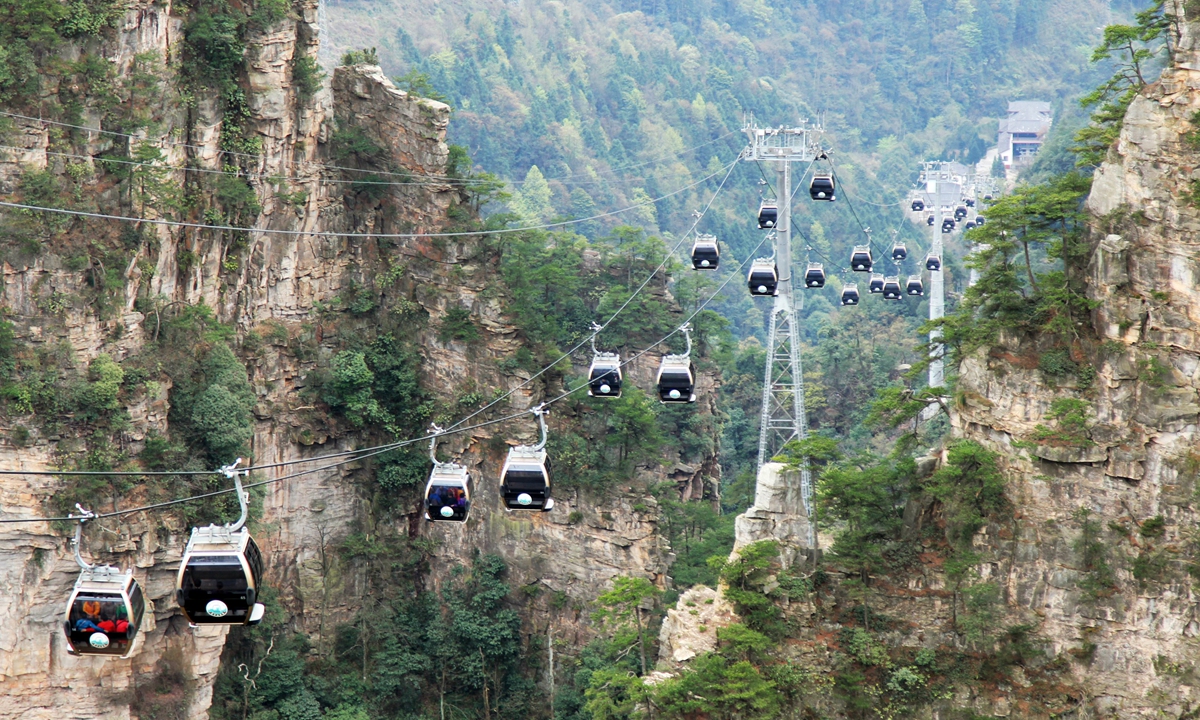
The lift at Zhangjiajie National Forest Park in Central China's Hunan Province Photo: IC
Zhangjiajie in Central China's Hunan Province, where James Cameron's blockbuster
Avatar was shot, ordered on Tuesday that all residents and tourists not to leave the city and cooperate with COVID-19 epidemic control measures amid the latest outbreak.
Civil servants as well as teachers at public schools are asked to report to their communities and join the epidemic control workforce, according to a government notice issued on Tuesday. Civil servants stationed in villages are also required to join rural control work, and their performances will be part of their career reviews, the notice said.
The city on Tuesday reported three confirmed cases and one silent carrier, bringing the total infections to 13 and 3 respectively.
The Global Times learned from local residents that they are having city-wide nucleic acid testing since July 29, and some key groups have taken the third round test. Necessities supplies encountered some difficulties but neighboring cities have transported vegetables and epidemic control materials to aid, a resident from Yongding district told the Global Times.
After discovering COVID-19 patients, Zhangjiajie closed all scenic spots and asked all tourists to take three nucleic acid tests before leaving the city. The Yongding resident said that most stranded tourists were allowed leaving after three nucleic acid tests. There are not many tourists still in Zhangjiajie.
Outbound flights were all canceled and highways entrances were controlled on Saturday. On Monday, the city announced no vehicles will be allowed on the roads except those used for epidemic control, transporting necessities, and ambulances and firefighting trucks.
Yang Zhanqiu, a virologist at Wuhan University, believed that the epidemic in Zhangjiajie could be contained in about two weeks.
"Delta variant is highly contagious, but has a shorter incubation period of 3 days on average. Infected people show symptoms early and can be quarantined on time," Zhang said.
The flare-ups traced back to imported virus, and cases will not occur among non-relevant groups. Close monitoring and screening, timely quarantine can handle the situation, Yang said.
Zhangjiajie is a famous tourist destination with scenic national parks, and is confirmed to be another key point on the infection chain after local patients' virus sequences were found to be the same with the one discovered in Nanjing, East China's Jiangsu.
Epidemiological investigations found a tourist departing from Nanjing may have infected tourists from across the country who watched a grand performance in Zhangjiajie. A 67-person tourist group from Huai'an, Jiangsu Province, who watched the same performance, has discovered 10 patients. So far, patients related to the Zhangjiajie outbreak have been reported in 8 provinces and regions including Beijing.
A Beijing-based immunologist said that the scale of the outbreaks is not comparable to last year. The country has gained experience in dealing with and controlling the virus, including testing and epidemiological probe. Therefore control measures will be restricted to places where flare-ups occur and will be loosened where the epidemic recedes.




